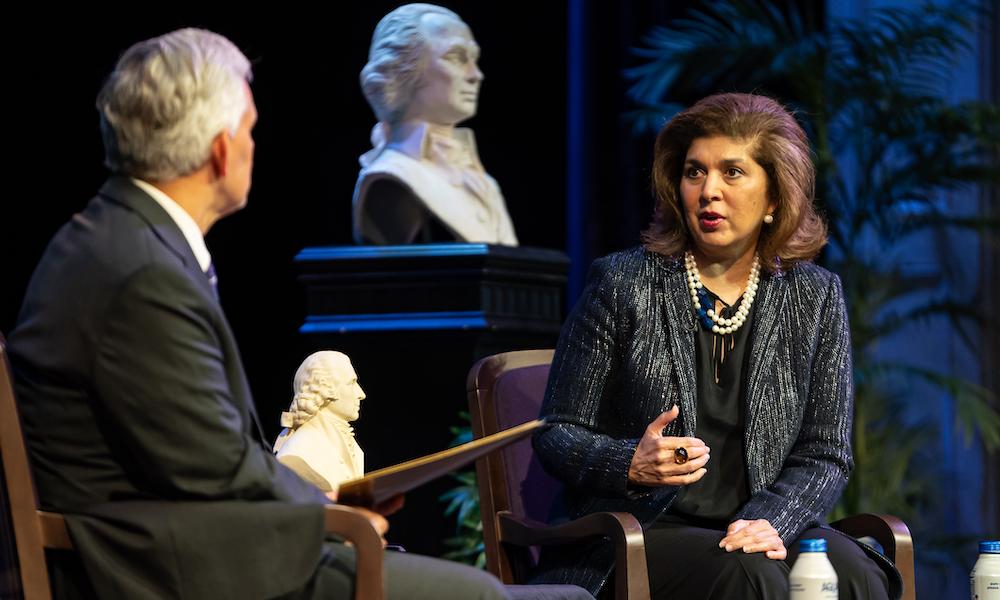Fighting the rise of hate
Featured Stories
SUMMARY: Farah Pandith, a foreign-policy strategist, former diplomat and an expert on countering violent extremism, was the final guest speaker of the 2021-22 Madison Vision Series. She is the author of the book “How We Win: How Cutting-Edge Entrepreneurs, Political Visionaries, Enlightened Business Leaders, and Social Media Mavens Can Defeat the Extremist Threat.”
By Emma Loscalzo (’22)
With violent extremism on the rise, containing the threat will require building bridges, engaging in civil discourse and taking action within our communities, guest speaker Farah Pandith said during the final Madison Vision Series event of the 2021-22 academic year.
Pandith, a foreign-policy strategist, former diplomat and an expert on countering violent extremism, joined JMU President Jonathan R. Alger on April 18 in Wilson Hall to discuss “How We Win: Fighting the Rise of Hate.” Pandith is the author of the book How We Win: How Cutting-Edge Entrepreneurs, Political Visionaries, Enlightened Business Leaders, and Social Media Mavens Can Defeat the Extremist Threat.
“Hate is a growth industry,” Pandith said. “It’s really well funded, and it’s really well organized.”
While she acknowledged that hate “cannot be eradicated from the planet,” Pandith said she is committed to shrinking the pool of people who find the “us versus them” ideology appealing.
“The ‘us and them’ is so profound right now, because it has been activated in a new way,” she said. “It’s turbocharged with the online dimension. But nothing happens in an online space that doesn’t first happen offline.”
Pandith, a political appointee under Presidents H.W. Bush, George W. Bush and Barrack Obama, and the first-ever Special Representative to Muslim communities under Secretaries of State Hillary Clinton and John Kerry, said our differences have long been considered a strength, but in recent years “haters” have used them to try to divide us.
“Before, there was a sense of civility, a sense of decency around how you speak to one another. Putting people down wasn't done in public in the same way,” Pandith said. “Today things have shifted. The gate has opened.”
Pandith said we often mistake civility as meaning that everyone has to agree, when in reality it means respecting differences of opinion. “We’re in America, and we are allowed to have different ideas,” she said.
|
“Hate is a growth industry. It’s really well funded, and it’s really well organized.” — Farah Pandith |
To combat hate and extremism, Pandith stressed the importance of building bridges between government, industry and communities. “You’re talking about changing neighborhoods, you’re talking about changing communities,” she said. “That requires you to partner with the entities on the ground.”
When it comes to solving big problems, the federal government functions best as “a convener, a facilitator and an intellectual partner,” she said.
Colleges and universities also have an important role to play, Pandith said.
“A university is about different ideas, but you have to know how to listen, how to engage, how to do this in a way that is respectful of the other, even if that person has an idea that is very difficult to hear,” she said.
Asked about grassroots approaches to fighting the rise of hate, Pandith said students can be catalysts of change.
“What is the point of being at a place like this, if you aren’t thinking about what you can do?” she said. “What can you do to make this place, this special place, what you want to make it? There are so many people in this community who have interesting ideas who want to do more. Bring them together. Think about ways to do this. Don’t wait.”
At the conclusion of the event, Alger presented Pandith with the 2022 Madison Award for the Public Good and an original work of art created by a JMU professor and his students.
